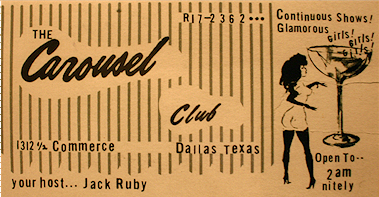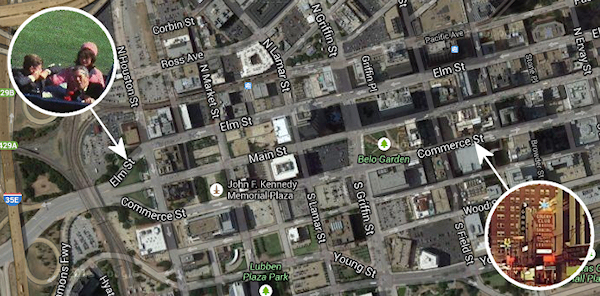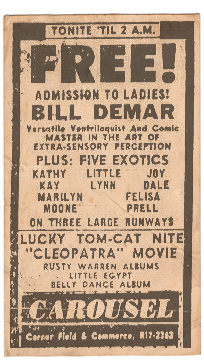MARIANO TOMATISWONDER INJECTORWriter of science with the
|
50 years after JFK’s death: the sad story of the forgetful mentalist  Exactly 50 years ago, in November 1963 William D. Crowe aka Bill DeMar was performing as a mentalist at the Carousel Club in Dallas, run by Jack Ruby. On November 22, a few blocks away from the nightclub, President John Fitzgerald Kennedy was assassinated by Lee Harvey Oswald. Two days later, Oswald was also killed, shot by Ruby — owner of the Carousel Club and employer of the mentalist.  The crime spot on the left, the Carousel Club spot on the right. Charged with investigating the case, the Warren Commission tried to find out the possible existence of a conspiracy, and sought to shed light on the relationship between Oswald and Ruby: was there any documentable link between the two? If so, it was possible that Ruby had killed Kennedy’s murder to prevent him from revealing the names of the masterminds behind the conspiracy. The New York lawyer Mark Lane revealed the journalist Hugh Aynesworth of being sure about the existence of a link between Ruby and Oswald: Sitting at Aynesworth’s kitchen table, Lane claimed that there was “no doubt” that Ruby and Oswald knew each other. He said he had an interview scheduled for the next day with a secret witness with an “impeccable memory” who had seen Oswald and Ruby together at the Carousel Club. (1) Aynesworth suspected that the witness was a lawyer, but probably Mark Lane was referring to Bill DeMar. The show he featured at the Carousel Club was based on a mnemonic test involving 20 people. At the end of the performance, the audience was convinced that he was endowed with an extraordinary memory. On November 24, DeMar told some journalists of having seen Oswald in the audience of the Carousel Club, and the news spread. On 2 June 1964, the mentalist was summoned and questioned by the Warren Commission. (2)   Soon DeMar felt himself trapped. From the stories of those who had seen him in action, the commission had concluded that it was natural for him to accurately remember the face of a person. At the same time, the mentalist realized the implications of his confession, and was no longer confident in his own eyes. Bill DeMar wanted to retract the statement made to the press, but doing it would have been an admission of the truth: the infallibility alluded by his performance was fake, just the epiphenomenon of a magic trick. Prisoner of a story too brilliant to be true, the mentalist was forced to spill the beans. Here is a snippet of the interrogation conducted by Leon D. Hubert: Hubert: What are the facts concerning your possibly having seen Oswald in that club?  Mr. Crowe (Bill DeMar): They asked me in what-how I had seen him in the club, and I said I thought I had used him as one of the people that was-that I would use him in my memory bit.  ...maybe it is as good as the ordinary persons. I know the system which is Spencer Thorton’s (3) to use in this memory bit and I concentrate on using it, and after it is over I have forgotten.  They built up the memory thing and they built up the bit of having seen Oswald in there, and I never stated deilnitely, positively, and they said that I did, and all in all, what they had in the paper was hardly even close to what I told them. Like most of the contemporary mentalists, Bill DeMar had succumbed to the temptation to use his art to earn a higher status. Using relatively simple techniques, they can pretend to possess abilities out of the ordinary, describing himself as special individuals even outside of the stage. But when the truth comes out — as it did miserably in Dallas — best not to be in their shoes. _________________ (1) Philip Shenon, A Cruel and Shocking Act, Henry Holt and Co., 2013, Chapter 14. (2) Warren Commission Hearings, vol. XV, U.S. Government Printing Office, Washington 1964, p. 106. (3) Spencer Thorton, Thorton’s Master Memory Course, 1957. |